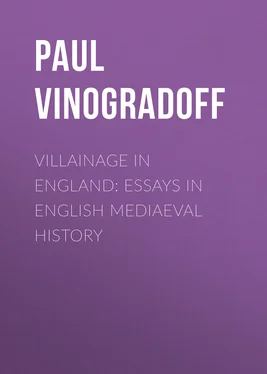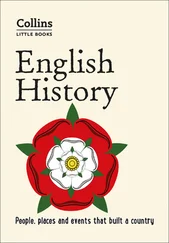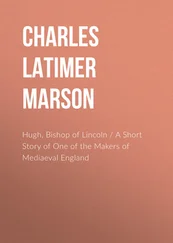Paul Vinogradoff - Villainage in England - Essays in English Mediaeval History
Здесь есть возможность читать онлайн «Paul Vinogradoff - Villainage in England - Essays in English Mediaeval History» — ознакомительный отрывок электронной книги совершенно бесплатно, а после прочтения отрывка купить полную версию. В некоторых случаях можно слушать аудио, скачать через торрент в формате fb2 и присутствует краткое содержание. Жанр: foreign_prose, Юриспруденция, История, foreign_edu, foreign_antique, на английском языке. Описание произведения, (предисловие) а так же отзывы посетителей доступны на портале библиотеки ЛибКат.
- Название:Villainage in England: Essays in English Mediaeval History
- Автор:
- Жанр:
- Год:неизвестен
- ISBN:нет данных
- Рейтинг книги:4 / 5. Голосов: 1
-
Избранное:Добавить в избранное
- Отзывы:
-
Ваша оценка:
- 80
- 1
- 2
- 3
- 4
- 5
Villainage in England: Essays in English Mediaeval History: краткое содержание, описание и аннотация
Предлагаем к чтению аннотацию, описание, краткое содержание или предисловие (зависит от того, что написал сам автор книги «Villainage in England: Essays in English Mediaeval History»). Если вы не нашли необходимую информацию о книге — напишите в комментариях, мы постараемся отыскать её.
Villainage in England: Essays in English Mediaeval History — читать онлайн ознакомительный отрывок
Ниже представлен текст книги, разбитый по страницам. Система сохранения места последней прочитанной страницы, позволяет с удобством читать онлайн бесплатно книгу «Villainage in England: Essays in English Mediaeval History», без необходимости каждый раз заново искать на чём Вы остановились. Поставьте закладку, и сможете в любой момент перейти на страницу, на которой закончили чтение.
Интервал:
Закладка:
One pleasant result the toil expended on mediaeval documents has brought me already. I have come into contact with English scholars, and I can say that I have received encouragement, advice, and support in every case when I had to apply for them, and in so large and liberal a measure as I could hardly hope for or expect. Of two men, now dead, I have to repeat what many have said before me. Henry Bradshaw was the first to lay an English MS. cartulary before me in the Cambridge University Library; and in all my travels through European libraries and archives I never again met such a guide, so ready to help from his inexhaustible store of palaeographical, linguistic and historical learning. Walford Selby was an invaluable friend to me at the Record Office—always willing and able to find exactly what was wanted for my researches.
It would be impossible to mention all those from whom I have received help in one way or another, but I should like to speak at least of a few. I have the pleasant duty of thanking the Marquis of Bath for the loan of the Longleat MS. of Bracton, which was sent for my use to the Bodleian Library. Lord Leigh was kind enough to allow of my coming to Stoneleigh Abbey to work at a beautiful cartulary in his possession, and the Hon. Miss Cordelia Leigh took the pains of making for me some additional extracts from that document. Sir Frederick Pollock and Mr. York Powell have gone through the work of reading my proofs, and I owe to them many suggestions for alterations and improvements. I have disputed some of Mr. Seebohm's opinions on mediaeval history; but I admit freely that nobody has exercised a stronger influence on the formation of my own views, and I feel proud that personal friendship has given me many opportunities of admiring the originality and width of conception of one who has done great things for the advancement of social history. As for F.W. Maitland, I can only say that my book would hardly have appeared at all if he had not taken infinite trouble to further its publication. He has not only done everything in his power to make it presentable to English readers in style and wording, but as to the subject-matter, many a friendly suggestion, many a criticism I have had from him, and if I have not always profited by them, the blame is to be cast entirely on my own obstinacy.
PAUL VINOGRADOFF.INTRODUCTION
When the time comes for writing a history of the nineteenth century, one of the most important and attractive chapters will certainly be devoted to the development of historical literature. The last years of a great age are fast running out: great has been the strife and the work in the realm of thought as well as in the material arrangement of life. The generations of the nineteenth century have witnessed a mighty revival of religious feeling; they have attempted to set up philosophical systems as broad and as profound as any of the speculations of former times; they have raised the structure of theoretical and applied science to a height which could hardly have been foreshadowed some two hundred years ago. And still it is to historical study that we have to look as the most characteristic feature of the period. Medieval asceticism in its desperate struggle against the flesh, and Puritanism with its sense of individual reconciliation with God, were both more vigorous forms of religious life than the modern restorations of faith and Church, so curiously mixed up with helplessness, surrender of acquired truth, hereditary instincts, and utilitarian reflection. In philosophy, Hegel's metaphysical dialectic, Schopenhauer's transformation of Kant's teaching, and the attempts of English and French positivism at encyclopaedical science may be compared theoretically with Plato's poetical idealism or with the rationalistic schools of the seventeenth and eighteenth centuries. But it would be difficult to deny, that in point of influence on men's minds, those older systems held a more commanding position than these: Hegel seems too arbitrary and phantastical, Schopenhauer too pessimistic, positivism too incomplete and barren as to ultimate problems to suit the practical requirements of philosophy; and people are already complaining of the decay of philosophical study. In science, again, the age of Darwin is certainly second to none, but it has to share its glory with the age of Newton, and it may be reasonably doubted whether the astronomer, following in the footsteps of Galileo and Kepler, was not actuated by even greater thirst and pride of knowledge than the modern biologist or geologist. It is otherwise with regard to history.
Progress of historical methods.
Students of science are wont to inveigh against the inexact character of historical research, its incoherence and supposed inability to formulate laws. It would be out of place here to discuss the comparative value of methods and the one-sided preference given by such accusers to quantitative analysis; but I think that if these accusers were better acquainted with the subject of their attacks, or even more attentive to the expressions of men's life and thought around them, they would hardly dare to maintain that a study which in the short space of a century has led to a complete revolution in the treatment of all questions concerning man and society, has been operating only by vague assumptions and guesses at random. An investigation into methods cannot be undertaken in these introductory pages, but a general survey of results may be attempted. If we merely take a single volume, Tocqueville's Ancien Régime, and ask ourselves whether anything at all like it could have been produced even in the eighteenth century, we shall have a sense of what has been going on in the line of historical study during the nineteenth. Ever since Niebuhr's great stroke, historical criticism has been patiently engaged in testing, sifting, and classifying the original materials, and it has now rendered impossible that medley of discordant authorities in which eighteenth-century learning found its confused notions of Romans in French costume, or sought for modern constitutional ideas as manifest in the policy of the Franks. Whole subjects and aspects of social life which, if treated at all, used to be sketchily treated in some appendix by the historian, or guessed at like a puzzle by the antiquarian, have come to the fore and are recognised as the really important parts of history. In a word, the study of the past vacillates no longer between the two extremes of minute research leading to no general results and general statements not based on any real investigation into facts. The laws of development may still appear only as dim outlines which must be more definitely traced by future generations of workers, but there is certainly a constant progress of generalisation on firmly established premises towards them.
Growing influence of history on kindred subjects.
What is more striking, the great change in the ways and results of history has made itself felt on all the subjects which surround it. Political economy and law are assuming an entirely new shape under the influence of historical conceptions: the tendency towards building up dogmatic doctrine on the foundation of abstract principle and by deductive methods is giving way to an exact study of facts in their historical surroundings, and to inquiries into the shifting conditions under which the problems of social economy and law are solved by different epochs. As a brilliant representative of legal learning has ironically put it, it would be better for one nowadays to be convicted of petty larceny than to be found deficient of 'historical-mindedness.' The influence of historical speculation on politics is yet more definite and direct: even the most devoted disciples of particular creeds, the most ardent advocates of reform or reaction dare not simply take up the high standing ground of abstract theory from which all political questions were discussed less than a hundred years ago: the socialist as well as the partisan of aristocracy is called on to make good his contention by historical arguments.
Читать дальшеИнтервал:
Закладка:
Похожие книги на «Villainage in England: Essays in English Mediaeval History»
Представляем Вашему вниманию похожие книги на «Villainage in England: Essays in English Mediaeval History» списком для выбора. Мы отобрали схожую по названию и смыслу литературу в надежде предоставить читателям больше вариантов отыскать новые, интересные, ещё непрочитанные произведения.
Обсуждение, отзывы о книге «Villainage in England: Essays in English Mediaeval History» и просто собственные мнения читателей. Оставьте ваши комментарии, напишите, что Вы думаете о произведении, его смысле или главных героях. Укажите что конкретно понравилось, а что нет, и почему Вы так считаете.












